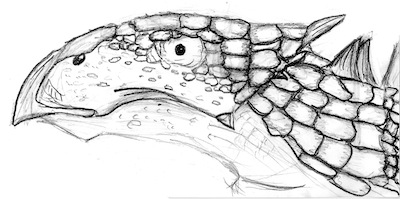
P.O. Box 1333
Merchantville NJ 08109, USA
Email: info@arxpub.com
 |
Arx Publishing, LLC P.O. Box 1333 Merchantville NJ 08109, USA Email: info@arxpub.com |
|
|
|
||
 |
THE Tarpeian Rock An Annual Literary Magazine "Hinc ad Tarpeiam sedem et Capitolia ducit aurea nunc, olim siluestribus horrida dumis." --Virgil's Aeneid, VIII, l. 347-8 |
Articles from the 2015 issue... Bearer of a Thousand Wounds A Cretaceous Carol The Knight and the Flaming Arrow Return to Tarpeian Rock homepage |
 In an instant my eyes shut
before a piercing light. I felt warm sun on my skin and heard
strange sounds that, though wholly different ones from the
American countryside, indicated that we had materialized out of
doors. Between blinks I determined that we were in a great
forest at the bank of a wide stream. But—what a forest it was!
In an instant my eyes shut
before a piercing light. I felt warm sun on my skin and heard
strange sounds that, though wholly different ones from the
American countryside, indicated that we had materialized out of
doors. Between blinks I determined that we were in a great
forest at the bank of a wide stream. But—what a forest it was!